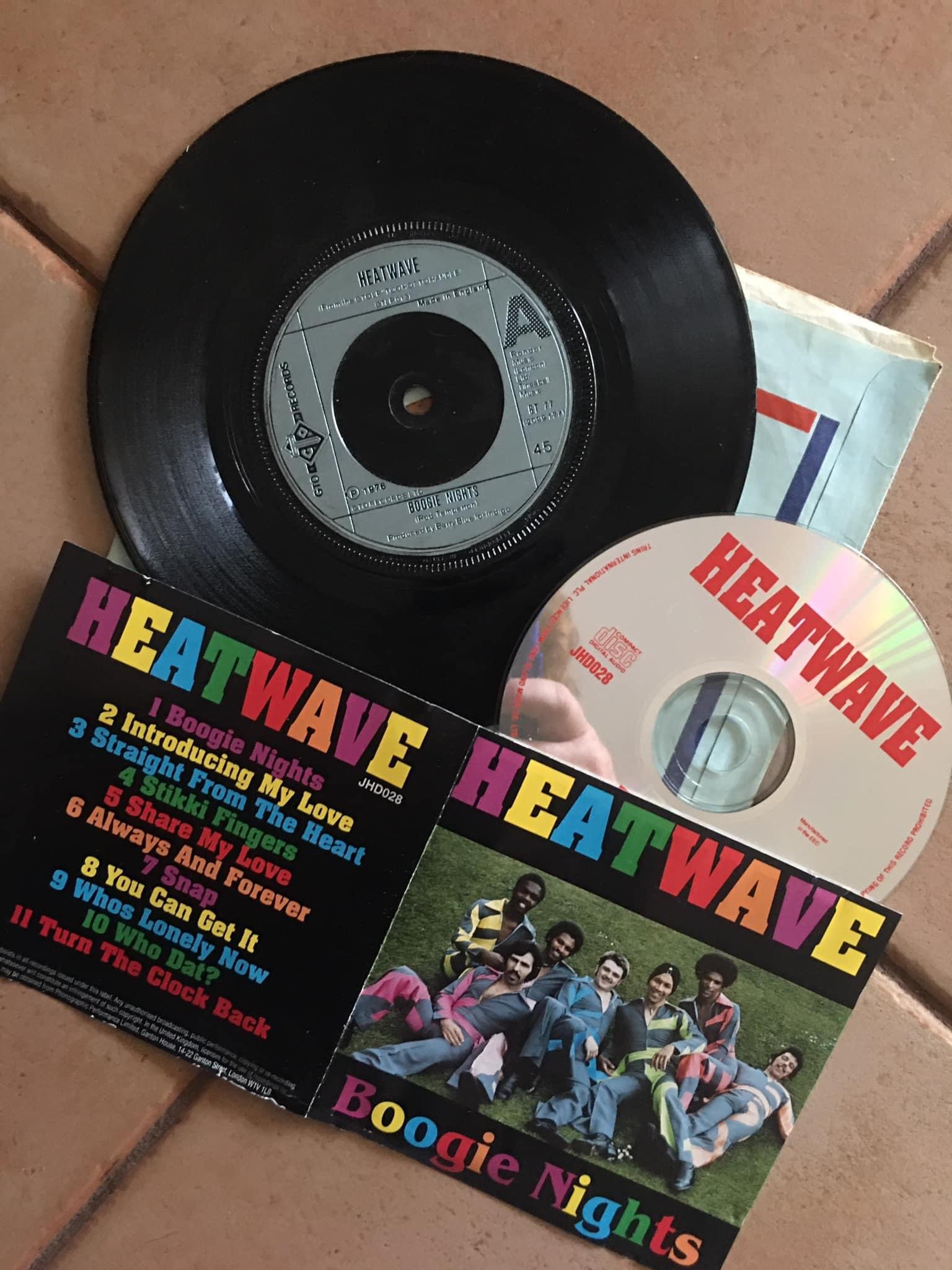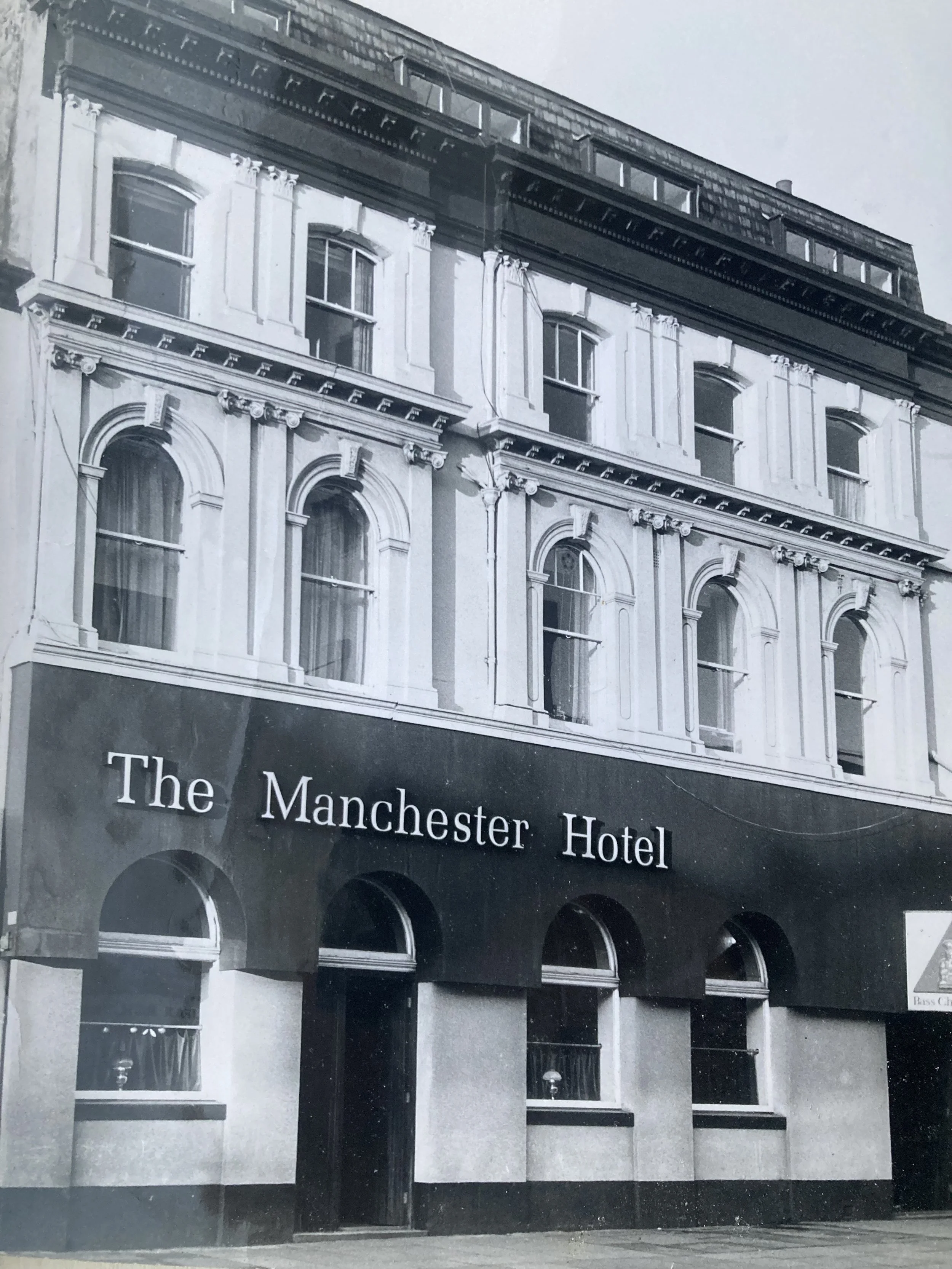From Trog Bar to Top of the Pops: How Rod Temperton & Heatwave conquered the charts
TALENT: Rod Temperton, second from right, with Heatwave
Now & Then, a column by Angus Young
Rod Temperton and Hull: Part Two of the songwriting genius’s formative years
Replying to a small advert in Melody Maker magazine from a soul group looking for a keyboard player would change Rod Temperton’s life forever.
It was 1973 and having spent the previous four years in Hull trying unsuccessfully to get his musical career off the ground, Rod was also now living in what was then called West Germany playing with a covers band and writing songs in his spare time.
Through the advert he met up with singer Johnnie Wilder, a discharged American soldier who had served in Germany and was now fronting a new mainly all-black band of fellow American musicians playing in military bases across the country.
The Cold War was about to introduce the world to Heatwave.
Over the next three years the band would adopt Hull as their second home as they rehearsed, played and recorded here before finally breaking through with UK and US chart success.
Rod later went on to write some of Michael Jackson’s biggest solo hits – all a far cry from Heatwave’s first live UK shows in Hull’s clubland.
When he first joined, the band featured a female singer called Melaine who would eventually be replaced by Johnnie’s brother Keith. The group’s line-up changed several times along with its name but with almost non-stop performing an impressive live show quickly developed.
With Rod aboard, they started to blend songs first nurtured in his freezing flat in Anlaby Road with American soul classics, often playing five 45-minute spots a night.
Back in Hull, Rod’s former booking agent Peter McLeod recalls getting a call out of the blue several months after he had left for Germany.
“Rod rang up and asked if he could bring Johnnie Wilder, the singer of a group he was working with, into the office. I asked what it was about. He just said: ‘We’ll tell you when we get there’.”
As Rod’s previous band in Hull had dabbled in prog-rock, Peter wasn’t sure what to expect when the pair eventually arrived at his office in Hessle.
“They came in and there was Johnnie – good-looking, athletic, he looked like a soul singer. Rod, who looked the total opposite, was next to him and just announced: ‘I’ve joined a soul band’.
“My jaw nearly hit the floor at the idea of Rod switching from the music he had been writing before to playing in a soul band but they desperately wanted to come to England to start working over here and get a record deal.”
IN THE GROOVE: Rod Temperton on stage with Heatwave
As it turned out, the move worked well for both parties.
The McLeod-Holden agency was already heavily involved in soul music with the likes of Jimmy James and the Vagabonds and The Fantastics on its books. It was also bringing international groups to the UK for tours and sorting out the necessary work permits for visiting musicians.
Heatwave certainly needed help in that department because the band’s cosmopolitan line-up not only eventually included a couple of Americans and a Brit with German residency permits, but Swiss-based Spanish bass guitarist Mario Mantese and Czech drummer Ernst ‘Bilbo’ Berger who, thanks to the Soviet Union’s 1968 invasion, was technically stateless.
Legend has it that Bilbo’s status often saw him being hidden with the band’s equipment in the back of a van as they crossed Europe’s many borders.
“The make-up of the group was a problem,” recalls Peter. “Getting Bilbo back and forth across borders was just horrendous and a couple of times we found ourselves being refused flights or ferry journeys with him.”
After the agency’s Ian Gray went to Germany to see a live show an initial four-week UK tour was arranged. Soon Rod found himself back playing in familiar venues in and around Hull.
CLASSIC CUTS: Sought-after vinyl and CD
The shows were mainly booked in traditional working mens’ clubs where totally unknown mixed-race funk-soul bands were few and far between.
Heatwave – then called Melaine and Johnny Wilder’s Chicago Heatwave before switching to Chicago Heatwave – started appearing on weekly bill listings alongside comedians, magicians, cabaret acts and striptease dancers.
Dates on the tour included gigs at the Charleston Club, the Phoenix Club and the Empress Club in Hull and the Nunsthorpe Tavern in Grimsby.
The first time McLoud saw them in action was at The Trog Bar inside the Manchester Hotel in George Street in Hull city centre.
“We used to do a Monday night there and we put name bands on every week because nothing happened anywhere else on a Monday so it was always full.
“They were every bit as good as Ian had said. The crowd got sucked into the material they did recognise and went along with what they didn’t know because it was so good.”
HOT TAKE: Studio owner Keith Herd, left, and engineer Roy Neave at Fairview Studios in Willerby
However, work permit restrictions meant the band could only play in the UK for short periods before returning to Europe. Thus began three years of travelling back and forth.
A deal with GTO Records was secured with the help of a demo tape recorded at Fairview Studios in Willerby in November 1974. The songs all written by Rod – Super Soul Sister, Always and Forever, Strictly Private Property and Come On Strong – convinced GTO boss Dick Leahy to put pen to paper.
In a Facebook post, guitarist Roy Carter, who played on that Fairview session, recalls: “I met Heatwave in 1974 and Rod had already outlined the Too Hot To Handle album in his head, on bits of paper and on a small dictaphone recorder.
“What you hear is what Rod gave us, to sing, play and rehearse from his gifts, skills and memory, merged with our talents and hard work.
“Hull was a life-changer as we spent time there rehearsing. Hopefully the sun has come out over Hull now but in those days it was always freezing!”
While in Hull, most of the band stayed in a guest house in Duesbery Street often used by the agency for its visiting out-of-town acts.
VENUE: The Manchester Hotel, home to Hull’s Trog Bar
Hull musician Peter Green worked as a technician on the Fairview session and was once asked by Rod to join the band but turned him down.
“I was about to get married and couldn’t commit to the constant touring. Musically, they were sensational and were far ahead of what I was probably capable of.”
The debut album took 20 months to record with the band splitting their time between touring and studio work. They would come to the UK for eight weeks at a time, spending half that period playing live and the other half recording with producer Barry Blue then it was back off to Europe.
The band returned to Fairview in March 1975 and recorded demos of future debut single Ain’t No Half Steppin’ and six other Rod-penned tracks including Turn Out The Lamplight which later featured on George Benson’s Give Me The Night album.
Like the first, the second Fairview session was produced by studio owner Keith Herd who says the return visit was very much about testing out potential songs for the album.
“Unfortunately, I didn’t get a copy of those tracks. They must have taken the master tape before I got the chance!”
OF ITS TIME: A newspaper advert promoting a Chicago Heatwave gig in Hull
By the time Too Hot To Handle was released in June 1976, Heatwave were playing everywhere, having graduated from working mens’ clubs to larger cabaret-style venues as well as the Hammersmith Odeon and Ronnie Scott’s Club in London. They also reportedly outclassed American soul group Tavares in a support slot on a UK tour.
Back in East Yorkshire this eclectic mix of venues continued as they performed at Withernsea’s Grand Pavilion and ended 1976 as the Boxing Day attraction at Cottingham’s Westfield Club.
By then, the first two singles from the album had failed to dent the Top 40 but Rod was keen to find out what DJ Tim Jibson thought of the next one.
Tim says: “Rod was in a club I was working in looking to arrange a gig and asked if I would play their new record. I put it on but the intro was so slow that I told him no-one would dance to that.”
Released in February 1977, Boogie Nights became a funk-soul classic, reaching Number Two in both the UK and US despite its extended jazz-tinged, harp-filled intro.
Rod and Heatwave eventually moved on from their adopted home city once fame and, in Rod’s case, considerable fortune followed.
As Peter Green puts it: “You just knew they were going to be big because Rod’s songs were so good and, as a band, they were just magical.”








